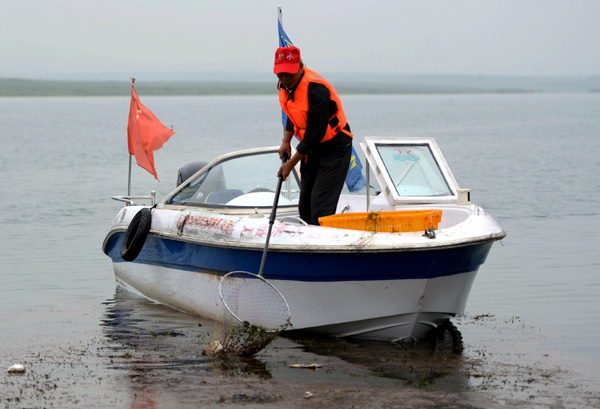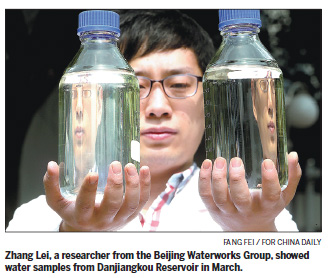 |
|
A worker in Xichuan county, Henan province, scoops out trash from Danjiangkou Reservoir, the starting point of the South-to-North Water Diversion Project's central route. XIANG MINGCHAO/CHINA DAILY |
Laboratory researchers provide key long-term data for operators
Although he repeats routine inspections on water quality for hours each day, Zhang Lei said he never gets bored.

For him, the pioneering research could be an important statistical source to guarantee safety when water diverted from Danjiangkou Reservoir arrives in Beijing.
In May 2011, the Beijing Waterworks Group, a major water supplier in the capital, set up a laboratory near Danjiangkou Reservoir, the source area of the central route of the South-to-North Water Diversion Project, to collect data on water quality, variations in seasons and other records.
When the lab was launched, Zhang, then a postgraduate student of environmental engineering, started his research on the water quality in the reservoir with other students and professors from universities and institutes in Beijing and Tianjin. Both cities will benefit from the diverted water.
"The routine inspection is kind of tedious in some people's opinion, but I am proud to participate in the massive engineering of the South-to-North Water Diversion Project in this way," the 31-year-old researcher said.
Zhang and his colleagues have followed strict procedures on water quality inspections every day, collecting water samples from the simulation water plant, and conducting a series of experiments to get thorough analyses and indexes for the water. The experiments can take hours or even a whole day depending on the water situation.
"The daily records combined can be an important source for water processing in the future," Zhang said.
From their continuous records, the researchers have found that the water quality in the reservoir is relatively stable in accordance with seasonal changes. In terms of hardness, it is better than the underground water pumped in Beijing.
However, in the flood season, the water in the reservoir becomes muddy as more water coming from streams and rivers flows into it. The indexes involving organic matter increase, according to research based on more than two years' records.
"In response, the water processing methods should be changed to keep the drinking water quality at a high level," Zhang said.
The team has also conducted several tests to simulate various conditions, helping them and the water plant in Beijing become aware of changing situations and giving them the ability to plan ahead.
Such tests by Zhang and his colleagues have become the major reference in Beijing by which to process the diverted water.
The laboratory has also tested the current processing methods used in Beijing's water plants. Through simulation processing, it proved that the methods used in Beijing would also work for the water from Danjiangkou Reservoir, according to a report from Beijing Waterworks.
"Our laboratory and the research institutes in Beijing support each other to guarantee the safety of water diverted from the reservoir, more than 1,000 kilometers away," Zhang said.
Once the central route is in operation, delivering water to the north, the laboratory will remain open for Zhang and his fellow researchers to continue their experiments.
